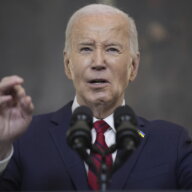Lee Bollinger, the president of Columbia University and a leading expert in the First Amendment, speaks at the National Constitution Center tonight in support of his new book, ‘Uninhibited, Robus, and Wide-Open: A free press for a new century.”
Bollinger says technology and events in socities around the world make our freedom of speech more vulnerable.
What needs to happen to make your idea of a “global First Amendment” happen?
First of all you have to work on building up a global, legal norm and the institutions to support it. You’re not starting from nothing there, because there already is Article 19. The United States subscribes to that universal declaration of human rights and there are also regional treaties that embrace an Article 19 approach. Article 19 is a very strong statement about freedom of the press and free speech. I think it’s a matter of working harder to try to build up those institutions and to give real meanings to those phrases, just as we did with the First Amendment over the course of the last century.
I try to make a very important point here in the book, which is that the First Amendment community, that is the law professors and people who focus on the First Amendment in this country, are very talented. It’s a very, very knowledgeable group of people. For the most part they pay very little attention to Article 19. Part of my goal is to try to engage that community with this global legal norm building and it makes a claim that we have to do in this century what we did in the United States in the last century, using the same legal arguments, the same legal tools in a broader context.
The second thing is we need to shape our own First Amendment experience to be a better model to the rest of the world. A lot of the world looks to the United States on how we actually implement our freedom of the press. … For example, finding now a right of newsgathering, the constitutional right of reporters to be present in war zones and that it’s not simply the government that decides whether they would like to or not have reporters, it’s actually a Constitutional right. That’s an example of how our Constitutional system could be improved to be a better example for the world.
The third thing is we need to improve the quality of journalism for the world. At the end of the day, the voice that America brings to news and reporting around the world will have a lot to do with whether people want it or not. There my primary proposal is that we create an American world service and launch NPR and PBS on a more global scale. Right now we have them largely focused on domestic broadcasting and leave the global broadcasting to Voice of America, Radio Free Europe and so on. I think those are in many instances very fine journalistic enterprises but they will always be seen as us government propaganda outlets and we need independent journalism perceived as independent journalism.
What type of response has your work received in countries that lack press freedoms?
I think there is a fear in many of those societies that if they allow greater freedom there will be disorder and even chaos and so on and I think they are very resistant as we see to this. But on the other hand many of these societies subscribe at least formally to very broad principles of freedom of press…even in the government institutions there’s a sense of being conflicted.
Within the society, often there are very brave and courageous people who are struggling for the news. People are hungry for information. Look at Iran and the post elections civil disobedience and protest and the crushing responses of the government. Those are really important to see in all their complexity and to try to help for advocating greater and greater freedom. I would say just what you expect, I suppose, that what I would call for would be considered dangerous by some.
What are the greatest threats to the First Amendment and freedom of press brought on by changes in technology?
I think the most immediate problem is the financial viability of the press. The business model of the media as we’ve known it or known them is under very serious pressure and for me the key part of that is the unfortunate contraction in the coverage of foreign news and national news and the closing of foreign bureaus and the decline of foreign correspondents, which are very expensive to maintain. I think that’s very unfortunate. We need to find ways to sure up that and build up and enhance that. I argue we may need to turn to public funding and I know that’s very controversial. That’s one thing, the threat to freedom of the press and the financial vulnerability of the press.
The second thing I would say is the new technology that makes global communication instantaneous and very effective communication widely available…that technology … also raises this very profound problem which I say is that censorship anywhere can become censorship everywhere. You may be vulnerable the to the censorship laws elsewhere in the world even though you are doing it from the U.S. The very technology that enhances your ability to communicate also makes you more vulnerable. That may lead to self censorship. …That is to me a primary impetus to saying we really need to now develop a global First Amendment. It must be the agenda for this century because now speech in the United States itself will be chilled by laws in the world. That’s what happened in this country with respect to local state jurisdictions over trying to control speech.
At some point by mid-century we realized that the First Amendment had to develop national standards, not just local standards, because the local standards were affecting national discussion about national issues. That’s when the Supreme Court really intervened and developed the national First Amendment that we see today.
What steps should the U.S. government take to ensure the open flow of electronic information?
I think we have to play a very active and aggressive role. That means a variety of things. I think it has to be a part of our foreign policy to achieve that. I think Secretary [of State Hillary] Clinton’s statement of our foreign policy now including ..freedom of speech is the right direction to move in…but I think it’s also necessary to incorporate the various points of contact with other countries and use those levers to advance freedom of speech. I’m thinking specifically about trade agreements and trade policy. We’ve been very good at building over the last couple of decades a global system of trade in goods and services. Now we need to develop a better global free trade in ideas and information. We can use the mechanism of trade, the WTO in particular, as a lever to try to get great freedom in the market place of ideas and info as well as the marketplace of goods and services.
What do you think the final outcome will be of the imbroglio between Google and China?
I have the sense that the lines have been drawn in the sand and Google is withdrawing to Hong Kong and maybe beyond…What’s going to happen is exactly what is up for grabs. This is where we really need to get serious about this and realize this is not just a problem with China, its not just a problem with the Internet, this is a global phenomenon and it requires concentrated comprehensive long-term planning and effort to really deal with this including making the case to the world as to why a global First Amendment … is a better way to live than one that a world that really constricts information flows. I don’t know how it will come out, that’s precisely why I think we need to engage with this in a major way, much more so than we are doing at the current time.





























